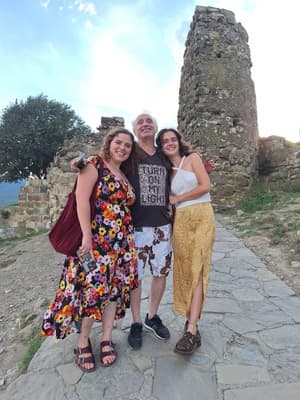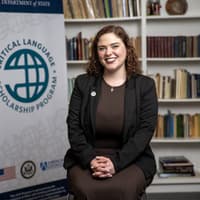Anna Kozan
Anna Kozan participated in the 2023 CLS Spark for Russian hosted virtually by American Councils for International Education in Chisinau, Moldova and the 2024 CLS Russian Program hosted by American Councils for International Education in Tbilisi, Georgia. Anna graduated from Ramapo College of New Jersey in May 2024 with a Bachelor of Science in Nursing and Bachelor of Arts in Spanish Language Studies. She is now living in Bengaluru, India as a Fulbright-Nehru Research Scholar conducting research on how language barriers affect access to healthcare. Anna is a Registered Nurse, and she plans to use her Russian skills to provide medical care to Russian-speaking populations affected by disasters worldwide.
Getting to Know Anna
I grew up in a small town in New Jersey. In my free time, I like to study languages, sing at church and perform in musical theater performances, take dance classes, and travel. My interest in studying Russian was piqued by my father, who is of Russian/Ukrainian heritage but was never taught the language growing up. In his adult life he became very curious about his heritage and taught himself the Russian language. This is still so impressive to me, and his motivation truly pushed me to study the language and learn more about my own heritage.
Your Favorite Russian Idiom
My favorite idiom in Russian is “вешать лапшу на уши, (Veshat' lapshu na ushi).” The literal meaning is “to hang noodles on someone’s ears,” but in Russian it means to deceive someone. I am not exactly sure how frequently it is used, but while I was abroad my native Russian-speaker friend taught it to me. I don’t know why but when I heard it, I laughed so hard and wanted to use it as often as I could. It’s such a cute expression!
Language & Disaster Relief Nursing
Currently, I am conducting research in South India on how language barriers affect access to healthcare and quality of said care. After this Fulbright year, I plan to work as a registered nurse to gain experience, hopefully as a pediatric intensive care unit (PICU) nurse, and obtain my master's in public health. After working as a PICU nurse for some years, I hope to further my education in nursing by becoming a nurse practitioner and travel around the world participating in disaster relief nursing.
Until We Meet Again
What meant the most to me on my study abroad program was getting the pleasure of meeting my host mom. She and I got extremely close during my time living with her. We still message and call weekly. The hospitality I was shown by her was unmatched. If I told her I liked something in her house, she would try to give it to me. If I told her I liked her dinner, she would make the same dish the next day because I liked it so much. But most of all, I was so touched by the deep, lifelong connection we made in just two months. I will never forget my last day in Georgia, when she and I sat in my bedroom, exchanged small gifts, and wept for an hour. Both of us refused to say “До свидания” (goodbye), but insisted on saying “До встречи” (see you later) or “Увидимся” (see you), knowing that in due time our paths will cross again.

Building Cultural Understanding
The CLS Program - both CLS Spark from Moldova and CLS in Georgia - left a lifelong impression on me. One thing that influenced me greatly is the fact that in both programs, I was learning from/in a country that is not well understood in the US. After both programs, I had a fairly strong understanding of each respective country’s culture, politics, and linguistic situation. Through my new understanding, I could raise awareness about not only these countries’ cultures, but also about their geopolitical importance.
Why Should Others Learn Russian?
I would absolutely encourage others to study Russian through CLS. In fact, after completing CLS Spark in 2023, I helped hold a panel on CLS at my college. There was one attendee who was interested in CLS Spark for Russian, and we spoke about the process of applying. He was the only applicant from my school for this language, and he was awarded the scholarship (shoutout to Edy)! Russian is an excellent language to communicate across cultures. Although some would consider the usage of this language controversial, many will admit that it is a powerful tool to communicate with others from many countries across Eastern Europe and Central Asia. I have made so many connections and friendships solely due to the Russian language proficiency that I have, for example, my relationship with my host mom, and I would not trade this connection for the world.
Words of Advice
In your application, BE YOURSELF. When applying for CLS, I had so many doubts, thinking that I would not even be considered for the scholarship because I was a nursing major. I then realized that I cannot hide who I am. I thought, perhaps my desire to speak Russian as a nurse is a unique strength, and in my application I was able to prove why Russian is essential for me and my career path. All of this to say, if you think your major or career path is too “unrelated,” think again. Do not silence that intrinsic desire to learn the language. You know why learning your target language is essential to you–lean into that, prove it.
Not Good, Not Bad, Just Different
My experience with CLS changed my life. It made me realize I can achieve so much more than I think, not just rapid language gains but confidence, independence, freedom to explore the world independently. It helped me realize that the best key to overcoming prejudice and bias is to exhibit cultural curiosity. While I was abroad with CLS Georgia, Mariam, one of the amazing staff in charge of the program at American Councils in Tbilisi taught us a phrase–”Not good, not bad, just different.” This phrase became an anthem for me when approaching any culture, including my own. It helps me to keep an open mind when approaching any culture, and to seek understanding rather than forming judgments. Finally, learning Russian through CLS made me realize how much of an exponential difference in my community and global communities that I can make. With every language comes hundreds of new connections. I hope to maintain this language and hold to that truth both in my present and future.
Alumni Profiles

Spark Russian 2023
Chisinau, Moldova
Posted Date
November 04, 2024


